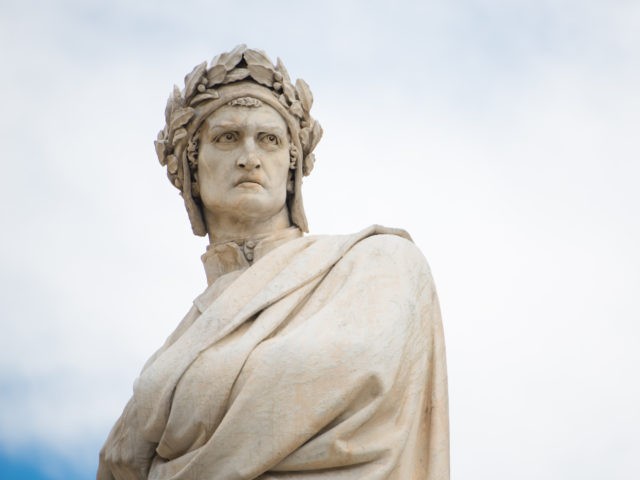A new Dutch translation of the medieval classic the Divine Comedy by Italian poet Dante Alighieri removes mention of the Islamic prophet Mohammed, who appears in Hell.
The new translation is said to be aimed at younger readers and censors any mention of the Islamic prophet to “not hurt unnecessarily”, according to the translator of the new edition of the work, Lies Lavrijsen.
Lavrijsen stated on Dutch-speaking Belgian radio that the redacted section involved Dante’s visits to one of the nine circles of Hell in the Inferno, specifically the eighth circle in which he meets the Islamic prophet, Mohammed, reports Le Figaro.
The section that mentions Mohammed — in this translation by nineteenth-century American poet Henry Wadsworth Longfellow, published by Project Gutenberg — reads as follows:
A cask by losing centre-piece or cant
Was never shattered so, as I saw one
Rent from the chin to where one breaketh wind.Between his legs were hanging down his entrails;
His heart was visible, and the dismal sack
That maketh excrement of what is eaten.While I was all absorbed in seeing him,
He looked at me, and opened with his hands
His bosom, saying: “See now how I rend me;How mutilated, see, is Mahomet;
In front of me doth Ali weeping go,
Cleft in the face from forelock unto chin;And all the others whom thou here beholdest,
Disseminators of scandal and of schism
While living were, and therefore are cleft thus.
While much of the passage of Canto XXVIII has been preserved, Mohammed’s name and the lines in which the Muslim prophet was punished for spreading Islam, or creating the “schism”, has been completely removed.
“The publisher’s goal was to make Inferno accessible to the widest possible audience, especially the younger audience, and we knew that if we left this passage as it was, a large part of the readers would have been unnecessarily hurt,” Lavrijsen said.
The translator added that the decision was made in concert with the book’s publisher, in the context of the murder of teacher Samuel Paty, according to Le Figaro.
Paty, who showed cartoons of Mohammed to his class last year during a lesson on freedom of expression, was subject to a social media campaign by Islamists and was later beheaded in the street by a Chechen refugee.
Later it was revealed that the girl whose claims sparked the campaign had lied about being in Paty’s class when the cartoons were displayed to pupils and had falsely claimed Muslims were singled out and asked to leave the room before the drawings were shown.
Her father, Brahim Chnina, who helped organise the social media campaign, was arrested after the killing. He is believed to have directly communicated with Paty’s killer before the murder.
The new translation of Dante has not been met without criticism. Dutch translator Peter Vestegen, who has also translated Dante’s work, labelled the move as censorship.
“The Divine Comedy is a sacrosanct masterpiece. You can’t cut it like that. In the Netherlands, I have never been asked [to censor the piece]. It is true that, in the case of an adaptation, one has more freedom, but then it must be indicated in the book that it is an adaptation and not a translation. In any case, no one asked for this capitulation,” he said.
Writer Abdelkader Benali even noted that Arabic translations of Dante had not changed the text for Arabic-speaking audiences, but said some versions had added footnotes explaining the historical context of the work.

COMMENTS
Please let us know if you're having issues with commenting.